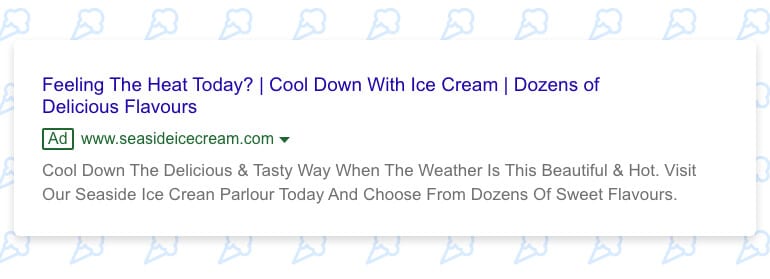By now you might have seen a thousand articles telling you why you need to use AI (Artificial Intelligence) for PPC.
I should know. I’ve written a good few of these articles myself, preaching the benefits for businesses of all sizes. If you’re unfamiliar with them, let me remind you that AI is:
- Fast, able to save you time and give you more hours to get your work done.
- Smart, able to process a lot of data and interpret the results before you’ve even got them loaded.
- Able to work 24/7, giving you around the clock monitoring of your campaigns.
This is all well and good, but just using AI isn’t the end goal. There’s a difference between simply using something and doing it correctly.

It’s like convincing someone to finally use Facebook for their plumbing business, but all they post about is what meal they’re having for dinner each day. I’ll be surprised if that’s able to bring the business in.
Get the picture?
So while using AI is essential for PPC, simply having it doesn’t mean you’re taking advantage of the best AI has to offer. And this is a damn shame. If you’re putting the time and investment into AI, you need to make sure that you’re finding the right solutions for your company.
To help, we’ve outlined 4 common ways you might not be utilizing AI properly – and how to change it.
1. Not using AI in the right areas
The first thing we need to cover what part of your campaigns you’re actually using AI for. This one is difficult because there’s no straightforward and easy answer. It all depends on your business.
Take a look at your current management process. Find out where most of your time is being wasted and then find the AI tools that solve this problem for you.
For example, if most of your time is spent on interpreting data, you need a way to do this faster. If it’s copy and pasting data into reports, you need an automatic reporting tool. If it’s adjusting budgets, you need an automated rule to do this.
Now, be prepared that although advertising platforms like Google will have internal AI tools, it’s not your only option.
In fact, I’ve argued before that AI for PPC is only useful if you use external tools. It was a bold claim but backed up by the fact external tools are just smarter, faster and ahead of the game.
You’ve just got to find the right AI that actually works for your company.
2. Using inefficient PPC scripts
Before I get started on this one, rest assured I’m not about to mindlessly insult PPC scripts. I’m very much in favor of them. When they work, they’re a brilliant way to save time and give you hands-free management.
Ah, hands-free campaign management. That’s the sweet stuff I like to hear.
PPC scripts are pieces of code you can copy into your account to automatically run certain jobs for you, like being able to change your bidding depending on the weather in a particular area.
That’s a game-changer for those whose business relies on the weather, like an outdoor crazy golf course or ice-cream parlor.

But… PPC scripts aren’t perfect. The code would have been written for one particular purpose, which means it might work for your exact needs. To do that, you need someone with javascript coding knowledge to go in and adapt it for you.
They’re also needed for when Google inevitably pushes out another update and your script no longer works. Yeah, it’s all fun and games in the PPC script world.
By all means, use PPC scripts as part of your AI solution. But make sure that they’re adapted to your company and aren’t wiped out by every tiny Google Ads update.
If you don’t have the on-team skills to edit the code, maybe you need to try tools that can do it all for you. Or, perhaps even consider using a PPC management agency who have the skills and resources to control it.
There’s no right choice for everyone. It’s all about figuring out yours.
3. You’re overcomplicating it
Data is the sweet nectar needed to correctly manage and optimize your campaigns. Without it, you may as well be trying to build a wall by throwing bricks in the dark.
But there is such a thing as too much data.
AI is amazing at gathering and interpreting data for you.
If you go into data overload, you’ll be hit with so many choices and options to consider that it can cripple you. Instead of using AI to easily solve one problem, you’ve made it so complicated that it creates 5 more.
As this article on keyword research pointed out, the sheer amount of data you can get from AI keyword generating tools can set you back. They can supply potentially billions of keywords – which are never going to be used.
You’ll be spoilt for choice and will have to dedicate more time deciding between things that weren’t even an option before.
If AI is making things more complicated then you need to cut back.
4. You’re too reliant on AI
With AI capabilities continually growing, there can be a temptation to just let it mindlessly run in the background. But you need to see the bigger picture. It’s no use mindlessly accepting every change that AI sends your way.
The curious part of you needs to ask why. Why do certain ads consistently perform better? What is it they do that the others don’t? Why do certain timeframes decrease your conversions?
As this article on Google Ads management pointed out:
“Google Ads management is all about being reactive: take onboard the changes and latest trends and adapt to them.”
In order to take onboard the changes, you need to understand why it happens. And no AI is going to do that for you.

Curiosity and creativity are both inherently human traits that AI will not be able to replicate anytime soon. Make sure you use them at every chance you get to make your campaigns the best they can be.
You can only make the best use of AI if you use it alongside your work, not to replace it.
Find the right AI solution for your business
If you want to make the best use of AI, you need to find the right tools for your processes.
Take a look at your current roadblocks and time-sinks. Find tools designed to help explicitly with this. Trial what works and see how much time it saves. Ensure it’s not creating more problems than it solves. Then use this time and data to better your strategies and campaigns. Don’t just rely on AI to fix everything for you.
The bottom line? AI and humans have to work together. Finding this balance is the key to your success.



